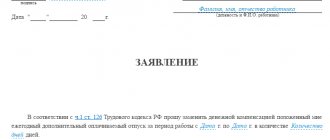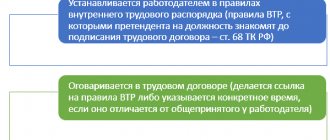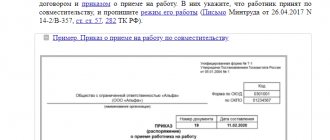Very often, workers suffer violations of their rights because they do not want to lose their jobs, since they have to pay loans and feed their families. But sometimes the employer’s actions become unbearable for the employee, and the person seeks protection of his rights.
Only the state has the right to hold the employer liable. And in practice there are many examples of holding an employer accountable and obligated to restore the violated rights of employees.
What can be considered a violation of an employee’s labor rights?
The following may be considered a violation of an employee’s labor rights by the employer:
- exceeding one's official powers , which can be expressed, for example, in forcing an employee to perform work that is not included in the list of his job responsibilities;
This may also include disrespectful communication, shouting, exerting psychological pressure, forcing people to work overtime, etc.
- disrespectful attitude towards the employee’s work (“prolonged” internship without pay, unreasonable removal from work, fines);
- unreasonable dismissal;
Read about what to do if you want to be fired here.
- irregular wages;
This also includes constant delays in wages, non-additional payments, deductions, fines, and deprivation of well-deserved bonuses.
- non-contractual form of cooperation;
When an employer hires an employee first as a trainee, promising to subsequently conclude an employment contract. However, this never happened.
- refusal to provide sick leave, vacation or time off;
- other unlawful actions or inactions of the employer that create a negative working atmosphere for the employee’s work;
Rest
Each employer is required to draw up a vacation schedule for the next calendar year. The schedule must be approved by December 15 of the current year for the next one. But not every employer adheres to this rule. When drawing up a schedule, management must take into account such a factor as the interchangeability of workers. That is, while one is on vacation, the other can do his job. In practice the situation is somewhat different. The schedule is drawn up “retroactively”, the employee goes on vacation at a time convenient for him, and there is no one to replace him. It turns out that in the summer, management begins to deprive other employees of rest.
This leads to the employer once again violating the terms of the employment contract and the provisions of the labor code. The Labor Code of the Russian Federation clearly states that every employee has the right to annual paid leave.
The minimum duration of vacation is 28 calendar days. Some categories of employees have the right to extended leave.
As practice shows, not all employees take their vacations. The bosses simply do not allow them to go on vacation, citing the fact that “there is no one to replace you” and “there is too much work right now.” This is a gross violation!
An employee has the right to go on full paid leave after six months of working for one employer. Management has no right to prevent this. Leave is granted at the request of the employee.
Management often uses such wording as “production necessity” so that the employee does not go on vacation at all or only uses a few days. But not every employer understands that “production necessity” must be properly documented. If an employee was unable to go on vacation for this reason, he will now be able to take his days off at any time convenient for him.
Where to contact?
If an employer violates an employee’s labor rights, contact one of the following authorities:
- Labour Inspectorate;
- Law enforcement agencies (prosecutor's office);
- Judicial authority;
When contacting one of the listed authorities, the employee must file a complaint against the employer, drawn up in any form or based on the established form.
Collective complaints (submitted by a group of employees), rather than individual complaints, are considered the most effective.
Read about the procedure for resolving collective labor disputes here.
Let's consider appealing to each of the authorities separately.
Labour Inspectorate
If the employee is unable to resolve the violation of his labor rights during peaceful negotiations with the employer, then the next step is to contact the Labor Inspectorate.
The responsibilities of labor inspectors include:
- Monitoring compliance with the current standards of the Labor Code of the Russian Federation;
- Assignment of liability for violation of current norms of the Labor Code of the Russian Federation;
When contacting the Labor Inspectorate, the employee must make a written complaint.
You can make a complaint either in any form or according to the established form by downloading it on the Internet.
Sample complaint to the Labor Inspectorate.doc
You can contact the Labor Inspectorate either in person, by filing a written complaint, or through the official website of the territorial division of the Inspectorate. In addition, you can call TI using the hotline number listed on the website.
The completed complaint can be delivered to the Labor Inspectorate in one of the following ways:
- Personally;
Contacting the Inspectorate in person will not speed up the process of considering the complaint. Therefore, you should choose this method of delivering an application only if you want to consult with Labor Inspectorate employees on some labor issues.
- By post;
The complaint must be accompanied by documents confirming the labor violations listed in the complaint. Otherwise, the complaint will not be considered.
The period for studying the complaint is thirty days (starting from the date of receipt of the application).
The complaint must contain the following information:
- The name of the organization whose leader is accused of violating labor rights;
- Details of the manager himself (full name, position held);
- Details of the applicant (full name, position);
- Description of the reason for filing the complaint with legislative references (articles of the Labor and Civil Code);
- A list of documents attached to the complaint confirming the violations described;
If employees approve the complaint, the organization against which it was filed will be subject to a surprise audit. If the violations specified in the complaint are detected, the employer will be subject to such “punitive measures” as temporary suspension from the performance of his official duties, an administrative fine, etc. The employee's rights, on the contrary, will be restored.
Employees of the Labor Inspectorate do not often undertake to “do justice” and, if the situation is ambiguous, they refer the case to court.
However, if the Labor Inspectorate refuses, you should not immediately go to court. Before doing this, you should contact a law enforcement agency - the prosecutor's office.
How to properly file a complaint
Regardless of where you plan to file a complaint against your employer, you must competently draw up a complaint or statement of claim. In addition to the applicant’s data, these documents must detail what, in the applicant’s opinion, was a violation of his rights by the employer, and which articles of the Labor Code were violated. The stated facts must be confirmed, the documents are listed in the complaint, and their copies are attached to it as evidence.
You can draw up an appeal or statement yourself, using samples on the official websites of government agencies or in legal reference systems. If you have doubts about the level of your own knowledge, it is advisable to use the help of professional lawyers and specialists in the field of labor law.
Contacting the prosecutor's office
The Prosecutor's Office, as well as the Labor Inspectorate, monitors compliance with the employee's labor rights by the employer.
You can file a complaint against an employer with the prosecutor's office either individually (on behalf of one employee) or collectively (on behalf of a group of employees).
Sample of an individual complaint against an employer to the prosecutor's office.doc Sample of a collective complaint against an employer to the prosecutor's office.doc
After filing a complaint with materials confirming labor violations, law enforcement officials study them within thirty days and then make a decision.
As a result, the employer can expect the following penalties:
- Bringing to administrative responsibility;
- Involvement in disciplinary action;
If a labor dispute has to be resolved in court, an employee of the prosecutor's office may (at his own discretion) become involved in representing the interests of the employee.
Court
The court is the last and most effective authority for resolving labor violations.
It is important to take into account the statute of limitations, which is 3 months from the moment when the labor violation of the employee’s rights by the employer was recorded. “Fixation” can be considered the moment when the employee learned that his labor rights were violated.
If the violation of rights is the unlawful dismissal of an employee, the statute of limitations in this case is thirty days from the date of issuing an order to dismiss the employee or putting a corresponding mark in the work book .
If the statute of limitations has expired, the employee may file a claim only if he shows good cause explaining why the claim could not be filed within the time limit for filing.
When filing a claim for violation of an employee's labor rights, you need to consider the following information:
- The statement of claim must be filed at the address of the company where the applicant works, in the district court;
- The filing of a claim occurs in accordance with the requirements presented in Article 131 of the Civil Procedure Code;
If the claim is drawn up without taking into account the requirements of Article 131 of the Civil Procedure Code, it may not be accepted for consideration.
- If the employee does not have sufficient evidence of a labor violation due to lack of access to such information at work, the claim can indicate a requirement to request the necessary list of documents from the employer by court employees. The employer will definitely not refuse to provide them with the necessary documents;
- The period for studying the claim is five days. After which the employee receives notification of his satisfaction or refusal. If the claim is successful, a hearing date will be set;
Many labor disputes end at the stage of filing and satisfying a claim, when the employer realizes that “the truth” is not on his side.
Nuances of implementing self-defense
As part of the implementation of the right to self-defense, several questions arise:
- Is it necessary to pay wages during the period when an employee does not fulfill his duties?
- Does the employee have to be present at the workplace?
So, do you need to pay a salary? In essence, self-defense is actually downtime due to the fault of the employer. According to Part 1 of Article 157 of the Labor Code of the Russian Federation, in this case the employee receives a salary, since the downtime did not arise through his fault. However, there are exceptions:
- The procedure in question does not apply if the employee refuses to be transferred to another position. In this case, he is unable to work. In this situation, it makes sense to pay for the period as forced absence (Articles 72 and 394 of the Labor Code of the Russian Federation).
- If work is suspended due to late pay, no payments are guaranteed.
Should an employee remain at work? The law does not clarify this issue in any way. Therefore, the decision is made on an individual basis. The employee must be guided either by the employer’s recommendations or by the internal regulations of the company.










